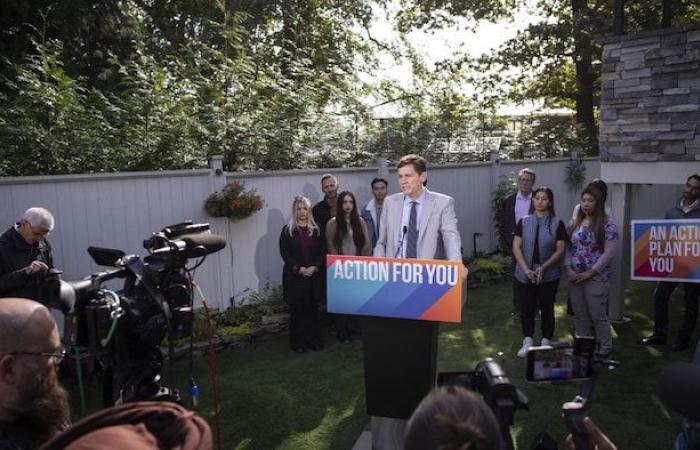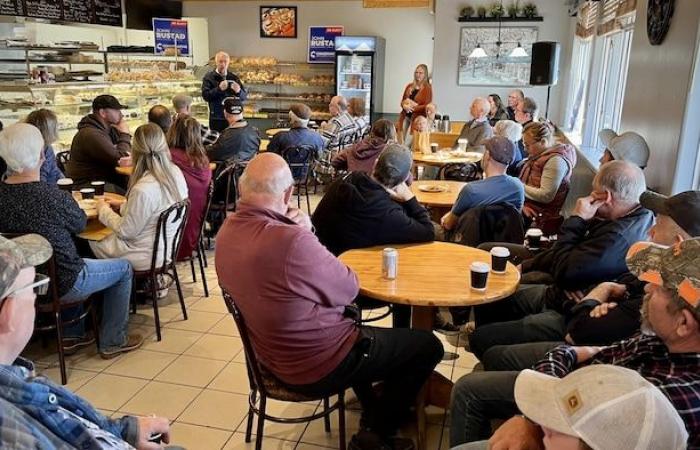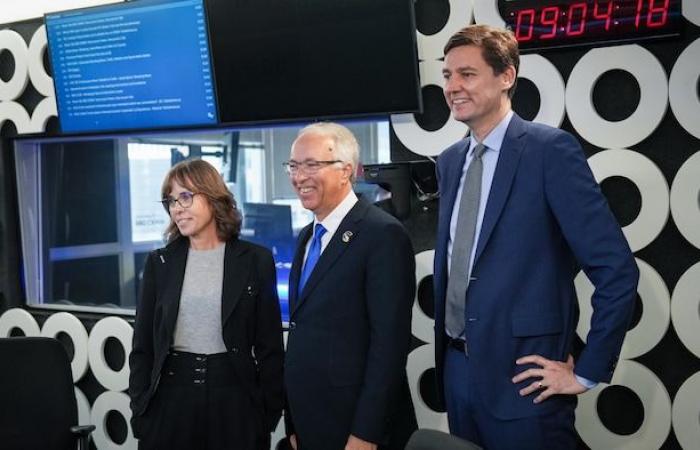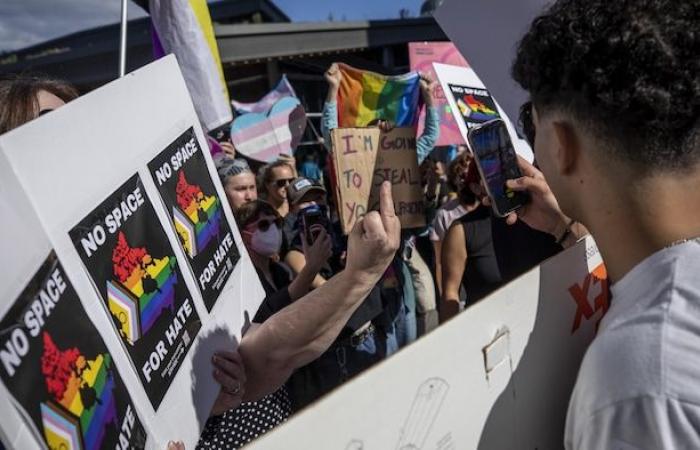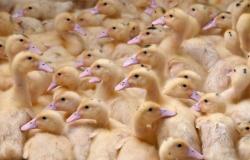British Columbia, where elections take place on October 19, is not immune to the polarization of political discourse. While the polls show the NDP and the Conservatives neck and neck, some fear slippage.
The founder of Lululemon, Chip Wilsonadded his two cents this week to an already tough election campaign in British Columbia.
In front of his residence in the chic district of Point Greyin Vancouver, the businessman had a sign installed where he described the NPD party Communist
. A response to comments from New Democratic activists accusing the provincial Conservative Party of being a party far-right
.
In response, the head of NPD David Eby reminded the multimillionaire that taxes on his $80 million residence were used to pay for social programs. For his part, Conservative leader John Rustad replied that he was not not disagree
when the businessman identified his opponent as a Communist
.
The anecdote illustrates the existing polarization in the westernmost province of the country, less than two weeks before the elections.
Open in full screen mode
NDP Leader David Eby presenting his platform this week in Surrey. Rather than defending its record, the NDP, in power for seven years, devotes its efforts to attacking its opponents. According to observers, the party was unable to adapt to the new campaign dynamics linked to the implosion of BC United.
Photo : ben nelms/cbc / Ben Nelms
For the chronicler of National Post Adam Pankratz, the current campaign and the implosion of BC United a few weeks before the elections reflect a divide that already existed in the province.
Since returning to the legislature last year, British Columbia’s Conservatives, who have not been in power in the province since 1952, have been taking positions on issues where there was previously political consensus, but not within the population.
BC United did not know or could not take positions which were, at the time, too controversial
he said, citing as an example in opposition to the carbon tax, in force since 2009 in British Columbia.
It was a position that was seen as extreme, but which the Conservatives had the luxury of being able to adopt because they were in such an inferior position. But it’s the right message for this election.
A global trend
The tone and rhetoric of the current campaign reflect what we observe elsewhere in the world, believes Élodie Jacquet, doctoral student at the University Simon Fraser specializing in the field of public engagement and democracy.
It is a phenomenon that has accelerated with the development of social networks and the decline in confidence of citizens in the information they receive, whether from their government or the media.
analyzes the researcher. There is a general decline in trust in institutions globally.
Canada and British Columbia are no exception to this trend.
According to a survey of 1,500 people conducted last year by the Public Policy Forum, a nonpartisan group, 70% of 18-35 year olds felt that Canadian society was moderately or severely polarized. More than 45% considered that the situation would get worse over the next five years.
Issues of vaccination, gender identity and sexual orientation, human rights and discrimination topped the list of issues dividing voters, according to the study’s authors.
Open in full screen mode
John Rustad is campaigning in Vanderhoof at the local bakery as a local candidate and leader of the Conservative Party. He has been a member of the Nechako Lakes constituency since 2005. Since the start of the campaign, John Rustad has held numerous public meetings with citizens.
Photo : Radio-Canada / Benoît Ferradini
The Rustad phenomenon
With his message of common sense
and his refusal to condemn candidates for past comments, John Rustad has built a coalition of voters who believe they are neglected by the main parties in the province, observes Élodie Jacquet.
There is an alliance of what I would call Old Guard Conservatives
she said, And we have this amalgam of people who are against the health measures of the pandemic, including people who were formerly on the left and environmentalists. Mr. Rustad said it, it’s a big tent, we welcome everyone.
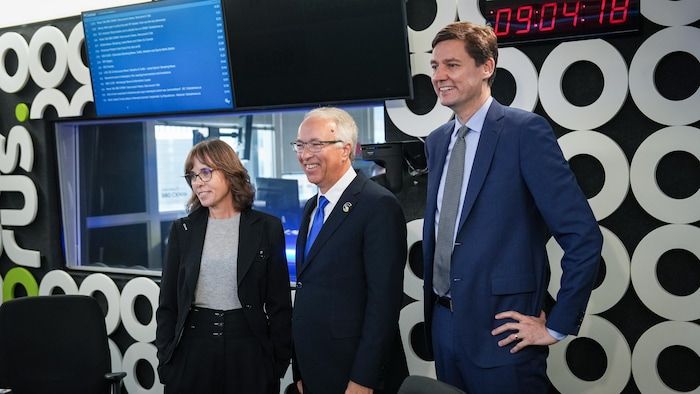
Open in full screen mode
Green Party Leader Sonia Fursteneau alongside Conservative Party Leader John Rustad and New Democratic Party Leader David Eby (right) shortly before the radio debate at CKNW in Vancouver.
Photo: The Canadian Press / Darryl Dyck
Reflecting this approach, in the CKNW debate this week, the head of NPDDavid Eby, tried to get his opponent to react to the sharing by a candidate on social networks of a conspiracy theory according to which the COVID vaccine caused AIDS.
John Rustad declined to comment, instead defending unvaccinated nurses who had been suspended during the pandemic.
Risks of abuse
Some are concerned about slippage linked to this approach, particularly towards minority groups.
Do you really believe that we don’t all see the propaganda he is making and how he uses third parties to push extreme points of view to find votes using methods that are unacceptable in Canada? ?
asks activist Morgane Oger.
According to her, by refusing to condemn the problematic comments of certain candidates on these issues, John Rustad contributes to the current polarization.
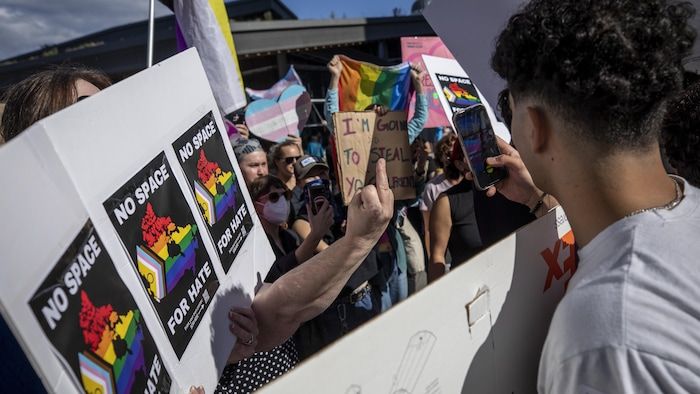
Open in full screen mode
Activists for and against inclusive resources on sexual orientation and gender identity clash in the streets on September 20, 2023 in Vancouver. The British Columbia Conservative Party dedicated its first question in the House as an official party to this issue.
Photo : Ben Nelms/CBC
She cites as an example the campaign led by the Conservative Party over the past year to draw attention to books deemed problematic in school libraries and in opposition to the use of inclusive resources on sexual orientation and gender identity in schools in the name of parents’ rights to be informed.
Over the past year in British Columbia, we have seen educators accused of manipulating children into gender change and professional attacks by activists. We see attacks against individuals based on their religion or on the perception of their ethnicity, that’s what we are seeing today.
As spokesperson for a foundation in her name, Morgane Oger says she has observed an increase in the number of calls from trans people or people belonging to minorities who feel threatened.
In a report published last year, the British Columbia Human Rights Commission also reported an increase in hate incidents since the pandemic.
Preparing for after October 19
Columnist Adam Pankratz, professor at UBChowever, rejects the extremist label that some associate with John Rustad, considering that voters are more interested in his economic message of common sense
.
Did any candidates say certain things that from time to time we might consider a little weird, yes! Are these things that make me very afraid of what they would do if they were in power with John Rustad? No, he is not an extremist
he said.
Regardless of the outcome of the vote on October 19, the campaign will leave its mark, at a time when British Columbia is going through a series of crises associated with the cost of living, housing and the record number of deaths by overdose.
We agree, there is not going to be a civil war tomorrow in British Columbia, but we are laying the groundwork for a society that will be fragmented
worries Élodie Jacquet.
I’m not so worried about governments, whatever they may be, but if we have a fragmented society, we will have more difficulty tackling these complex problems.
An audio version of this report will be broadcast on the show All Terrain

